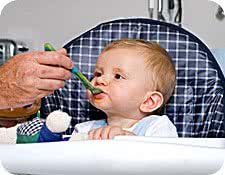The Not-So-Sweet Risk of Feeding Honey to Your Infant
As a new parent, you want to do the best for your baby. You may feel a push towards products that are labelled “natural”, “organic”, and “non-GMO”, but when it comes to sugars and sweeteners, a natural alternative might not be best.
In Canada, honey has been linked to cases of infantile botulism.
Infantile botulism is a rare, but serious form of foodborne illness (food poisoning) that can affect infants up to one year old. During the first year, babies’ immune systems are still developing, and there aren’t enough beneficial bacteria in their little bodies to protect them from major threats.
What causes infantile botulism?
Infantile botulism is caused by toxins created by Clostridium botulinum bacteria, who’s spores can sometimes be found in both pasteurized and unpasteurized honey. In a healthy adult body, Clostridium botulinum spores have a hard time finding a space to grow, but the weak immune systems of infants cannot protect them just yet. If Clostridium botulinum spores find a place to grow in the infant’s intestine, the bacteria will emerge from their spores and begin creating toxins as they grow. These toxins cause botulism, and in an infant body, the amount needed to cause illness is minute.
Immunity builds with age
After their first birthday, your child’s immune system will be developed enough to help protect against Clostridium spores. The risk of infantile botulism decreases after age 1.
Clostridium botulinum
Clostridium botulinum are normal bacteria commonly found in the soil that create a toxin called botulinum as they grow. Unfortunately, botulinum toxin does not change how food looks, smells, or tastes. There is no way to know whether the food is infected or not by using your senses, and while cooking to high temperatures can kill a great deal of illness-causing microbes, it will not kill spores. Even pasteurized honey may have Clostridium botulinum spores that survived undetected in it. The bacteria won’t cause problems unless they can get into a good environment for growth (like inside your baby’s body) and come out of their spore shells to grow.
Symptoms
Contact your doctor immediately if your baby shows any of these symptoms of infantile botulism:
- Constipation
- Weak muscles, including: wobbly head from a weak neck, weak arms and legs, and too weak to cry or suck as usual
- Lacking facial expression
- Having trouble breathing
- Inability to swallow
- Irritability
Without immediate treatment, the toxins can cause paralysis and ultimately death.
To Reduce the Risk
- Don’t give any type of honey to infants under one year old
- Read labels for honey as a sweetener
- Don’t allow any of the baby’s soothers, bottles, or toys to come into contact with honey
- Don’t add honey to the baby’s formula, food, or water
- Be wary of home-canned, low-acid foods (especially green vegetables)
With proper treatment, mortality rate is 5-10% in Canada. Read more about infant botulism and Clostridium Botulinum on the Government of Canada website.




Leave a Reply
Want to join the discussion?Feel free to contribute!